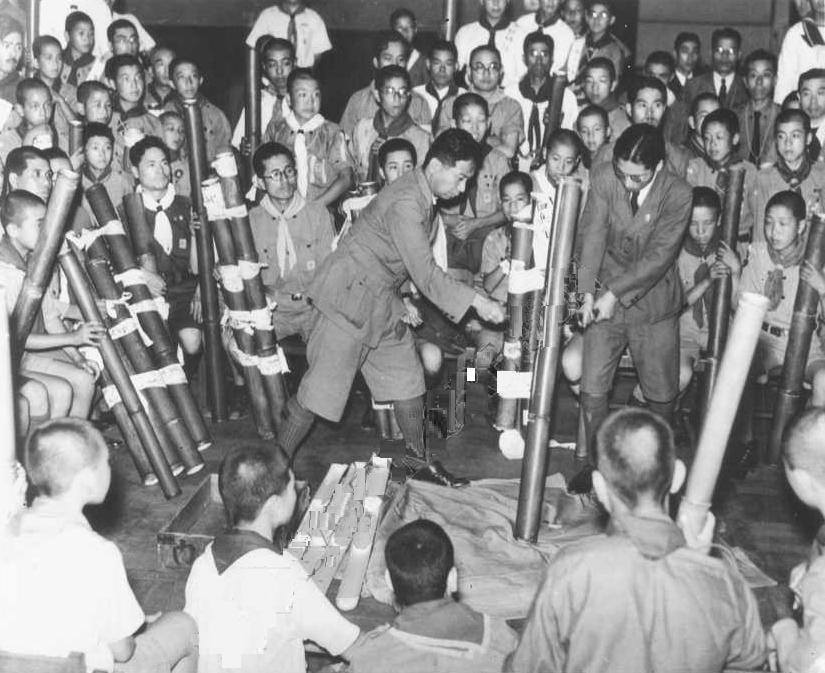
Japanese Boy Scouts: History--The 1930s

Figure 1.--These Japanese Boy Scouts are being shown how to make bamboo tube coin collectors. They are seekibng domations to support the troops which have just invaded China (1937). The press caotion read, "Tokyo Boy Scouts aid national defense fund: These Jpanesev Boy Scouts are making bamboo tubes in which to collect donation to the National Defense Fund recently authoruized as a result of the fighting in North China. Groups of couts comb the city carrying tunes into which coins can be dropped." The photograph was dated August 6, 1937.
|
|
Scouting was still operating in Japan during the 1930s in the years leading up to World War II. Scouting had been seen by some as part of the country's modernization process. By others in increasingly nationalistic Japan, it was seen when some by others as a Western asault on traditional Japanese values. The Japanese military suring the 1930s was inceasingly dominating Japanese society. One source indicates, "In the 1930s the voluntary Boy Scout organization was forced to transform itself into a militaristic association, starting with an incident at the Osaka Boy Scouts." [Fujimoto] We are not sure yet just what occurred in Osaka. Formal exchanges with the Boy Scouts of America (BSA) ceased. We are not sure just how this was inforced, but it was at a time when Aneruca public opinion began to turn against Japan bcause of the invasion of Manchura and this only worsened with invasion of China proper (1937). Despite the increasingkly strained relatiions, Trans-Pacific Japanese interest in the BSA continued. One source writes, "Observing the US treatment of minorities in a domestic colonial situation (blacks in the South) the Boy Scouts came to be utilized as a cultural agent for supporting the Japanese empire in Eastern Asia and the South Sea Islands." This of course is absured, typical left-wing attempts to blame everything, including Japanese militarism and imperialism on America. Fior one, the BSA did not have a colonial mentality. Nor was the BSA a supporter of racism. Racism or segregation was never endorsed by the BSA, although it did not criticuse segregationin the South. Blacks in the North were integrated into Scout troops and separate in the South, but this had nothing to do with colonialism. The Japanese needed no instruction in colonialism or racism. They were very good at both and both were home-grown phenomenon. And the American colonial venture had absolutely no influence on the Japanese. The United States supported democracy, the rule of law, and self government in the Philippines and scheluded full indepndence. Nothing could be different from Japanese colonialism. With the Japanese invasion of China (1937), Scout units engaged in activities supporting the troops.
Sources
Fujimoto, Shigeo. "Trans-Pacific Boy Scout Movement in the Early Twentieth Century: The Case of the Boy Scout Movement in Osaka, Japan" Australasian Journal of American Studies (2008) Vol. 27, No. 2, pp. 29-43. The author here seems to be attemopting to blame Japanese racist and colonialmpolicies on the United States. This is a trend in Japanese literature in World War II, attempting to shiftblmefor the War on the United States. Some authors use the atmic bomb to portray Japan as a victime in the War rather than the aggesor country which launched the Pacific War.
HBU

Navigate the Historic Boys' Uniform Chronology Pages:
[Return to the Main chronologies page]
[The 1900s]
[The 1910s]
[The 1920s]
[The 1930s]
[The 1940s]
[The 1950s]
[The 1960s]
[The 1970s]
[The 1980s]
[The 1990s]
[The 2000s]
Navigate the Historic Boys' Uniform Web Site:
[Return to the Main Japanese Scout history page]
[Activities]
[Biographies]
[Chronologies]
[Countries]
[Essays]
[Garments]
[Organizations]
[Religion]
[Other]
[Introduction]
[Bibliographies]
[Contributions]
[FAQs]
[Questions]
[Unknown images]
[Boys' Uniform Home]
Navigate the Historic Boys' Uniform Web organizatiion pages:
[Return to the Main Japanese country page]
[Return to the Main Japanese Scout page]
[Return to the National Scout page]
[Return to the Japanese World War II home front page]
[Boys' Brigade]
[Camp Fire]
[Hitler Youth]
[National]
[Pioneers]
[Royal Rangers]
[Scout]
Created: 4:49 AM 3/14/2013
Last updated: 4:50 AM 3/14/2013



